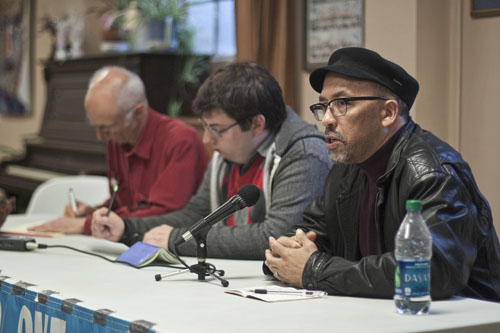On Saturday, the International Socialist Organization hosted Bill Fletcher Jr., a renowned Marxist and labor activist, who spoke before a modest yet passionate crowd at the United Church of Christ in Northeast Portland.
Activist urges unity

On Saturday, the International Socialist Organization hosted Bill Fletcher Jr., a renowned Marxist and labor activist, who spoke before a modest yet passionate crowd at the United Church of Christ in Northeast Portland.
Fletcher stressed that the political left in the United States desperately needs to redefine its goals among the list of new crises the nation faces.
Fletcher emphasized that these crises are producing a very serious situation: a massive polarization of the nation’s wealth brought on by what he described as right-wing populism.
“The term that’s regaining use is plutocracy” to describe the phenomenon, and the moneyed group whose members he considers “in charge,” Fletcher said.
He described the current crisis in a threefold manner: economic, with what he called a structural system in trouble; environmental; and the crisis of confidence in our government, which he believes is compounding the other two.
“Under both Democrats and Republicans we’ve seen a shift to the right, at the same time that neoliberalism is strengthening,” Fletcher said.
He went on to say that the strength of right-wing politics has been aided by the persuasive narratives they deliver to the public. These narratives, he said, are often tied to blaming one group’s problems on an entirely different demographic. This tactic has strengthened the resolve of many who are struggling in the current environment.
Famous among these is the narrative that “white America” is being marginalized by other demographics that are gaining prominence.
“This country began as a white republic,” Fletcher said. “The rest were at best guests and at worst interlopers.”
The right wing is playing off this theme, Fletcher continued, but attitude is changing with changing demographics in this country.
Fletcher sees this change as a potential opportunity for the political left. In the wake of these crises, along with the changes in demographics, he believes that a new era of organization may be emerging for the political left.
According to a Gallup poll Fletcher cited, 30 percent of Americans (roughly 90 million people) have said they would try alternatives to capitalism. Such big numbers, Fletcher suggests, mean that the left needs to reorganize its message to reach out to this group of citizens.
“We’re not used to thinking on the scale of thousands and thousands of people, and that’s the challenge,” he said.
In the end, Fletcher’s message centered on the need to reimagine the organization of such a potentially large group.
“In the absence of organization, people look for all kinds of solutions,” he said, adding that the left needs to seek more concrete stances for people to latch onto and that it’s not enough for people to talk in abstractions.
“What people need is a counternarrative telling people who are being hit by the right that it’s not their fault,” Fletcher said.
To genuinely engage with this large group, the left must find linkages between the struggles of its various elements.
“It means repudiating a small-group mentality,” which Fletcher suggests is what the left is used to. “The obligation of the current left is to ask ourselves, ‘What are the questions that we can unite on?’”







